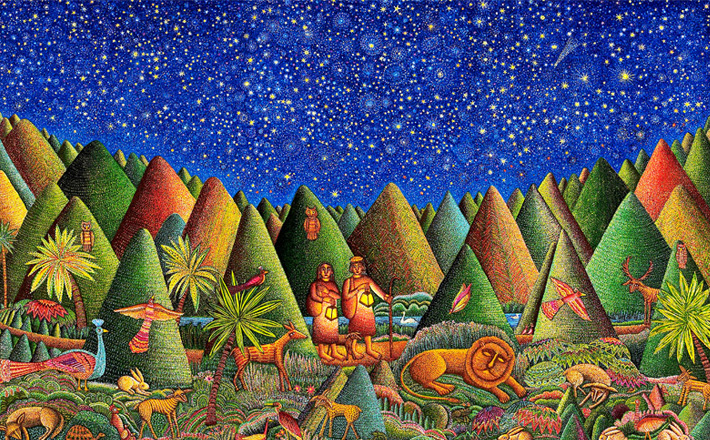Commentary on Genesis 32:[9-13] 22-30
Although the story of Jacob’s wrestling with the mysterious man at the Jabbok until daybreak most likely has roots in an old legend about a river demon, the story in its current form strongly suggests, though never entirely confirms, that Jacob’s opponent is God.
Jacob’s own dawning realization is reflected his act of naming the place Peniel: “For I have seen God face to face, and yet my life is preserved” (Genesis 32:30). The story thus bears an interesting resemblance to the story of Abraham’s encounter with the three men in Genesis 18. Just as Abraham provides rest and refreshment for three passersby only to discover that his guest is the LORD, Jacob does not know until it is all over that the man who has attacked him is God. There the similarity ends, however, since Jacob’s encounter is anything but peaceful. The story implies that the man has attacked Jacob, and Jacob seems ready to fight to the finish. When the stranger realizes he cannot prevail against Jacob, he touches him in the hip socket, thereby wounding him in a bid to get Jacob to let him go. But Jacob hangs on, demanding a blessing. Whereas Abraham’s blessing is a gift rewarding his own hospitality, Jacob’s blessing is wrung from his opponent as if his life depended on it. And indeed, it is this tenacity that is honored in his new name, Israel: “You shall no longer be called Jacob, but Israel, for you have striven with God and with humans, and have prevailed” (32:28).
Jacob’s wrestling with God challenges preachers to contemplate darker aspects of human encounters with God. What, specifically, does Jacob’s new name “Israel” connote about the significance of this encounter? The alternative “Priestly” version of Jacob’s naming occurs in chapter 35, where God is every bit as terrifying as in the Jabbok story. In this later episode, however, God is on Jacob’s side, shielding him as he travels through potentially hostile cities (35:5). In this story, the meaning of the name Israel, “El strives,” or “El rules,” is portrayed in God’s display of terrifying power for Jacob’s sake. In Genesis 32, however, the story, as well as the explanation of the name, emphasizes Jacob’s striving (verse 28). Because the name identifies Jacob as the progenitor of the nation of Israel, it clearly marks a change in his identity and status; but what is the nature of that change?
Many modern readers find Jacob’s deception and theft of his brother’s birthright morally problematic; consequently, some interpreters are inclined to see the name change as a complete reversal of Jacob’s character.1 Others, like J. C. L. Gibson, cannot give Jacob even that much credit, asserting that “not even after this scarifying experience do we have a Jacob we can genuinely like.”2 But I would contend that Jacob’s new name is more of an affirmation than a reversal of his past identity. Indeed, the triple punning of the names Jabbok (ybq), Jacob (y?qb), with the rare verb “wrestle” (‘bq) suggests that Jacob’s wrestling with the man at this particular place becomes the occasion for affirming the trajectory of his life. Rather than signify Jacob’s becoming a new man, the name sanctifies the man he has been all along.
In the narratives leading up to this encounter, Jacob has certainly prevailed against his brother Esau and his more powerful father-in-law Laban. But in the episodes in chapter 32 leading up to this incident at the Jabbok, the outcome of Jacob’s next encounter, his hoped-for reconciliation with Esau, is far less certain. Whether he acts out of fear or shrewdness is an open question. In what has been called a model prayer,3 Jacob puts the entire matter into God’s hands (32:9-12); at the same time, he does everything humanly possible to mitigate the nearly certain losses (32:7-8) and appease Esau (32:13-21). Finally, in an action whose significance remains unclear, Jacob crosses the stream with his family by night (verse 22)—or sends them on ahead (verse 23)? Whether he is on the other side of the Jabbok or not, he has separated himself from his family, and it is not clear whether he has done this to protect them, or to use them as a buffer between himself and his brother.
Having prepared for one confrontation, Jacob faces a far more serious challenge when the man attacks in the night. The episode is deeply mysterious, not only because Jacob’s opponent is never fully identified, but also because the ambiguous use of third person pronouns in verses 25-26 makes it difficult to ascertain who launches the attack or who it is who first realizes he cannot prevail. It is only in verse 27 when Jacob gives his name to his attacker that we are able to determine which wrestler is which. Roland Barthes points out that this intertwining of the two wrestlers’ identities is due to the paradoxical nature of the struggle.4 Whether Jacob’s attacker is God or a demon, his supernatural powers would surely give him the upper hand. However, as day is breaking, it is this allegedly stronger one who is the first to realize he cannot prevail against Jacob. He then resorts to what Barthes calls a low blow, wounding Jacob in the hip and demanding to be let go.
On both points, the victory should go to the attacker; yet this round, at least, is won by Jacob, the wounded, weaker one. It is worth remembering that Jacob is does not yet know the identity of his attacker. All he knows is that he is now wounded. Nevertheless, he refuses to let his attacker go until he blesses him. In response, the attacker first asks Jacob’s name, then tells him he will no longer be called Jacob but “Israel.” In so naming him, the man appraises Jacob’s character while also conceding that Jacob has also prevailed against him. But it remains unclear whether Jacob prevailed against an ordinary man, or elohim, and if the latter, whether the “man” is simply a supernatural being, or Israel’s God. The narrative remains elusive on this point. When Jacob asks to know his opponent’s name, the man evades the question but finally blesses Jacob.
Although the attacker never fully discloses his identity, Jacob draws the conclusion that he has seen God face to face. It’s worth noting that this emphasis on seeing God’s face echoes his yearning that he might see the face of Esau (32:20). But this encounter is not as he had imagined with Esau, or has he had performed it—as a supplicant to a lord in some courtly display of manners and protocol. Instead, in this encounter, he sees God’s face as one of two strangers locked in a wrestler’s embrace, each grunting and panting to pin the other to the ground. Walter Brueggemann observes, “Unlike every other such relation in which God rules and humankind obeys, Israel is a newness which has prevailed with God.” At the same time, we are not to see Jacob and God duking it out as two equals. As the one who is wounded, Jacob is the weaker one; nevertheless he does prevail under God’s assault: “Israel does see [God] and live. But it is not suggested that the seeing leaves one the same, unscathed.”5
If, as Gibson has noted, Jacob is a difficult person to like, he is in many ways an everyman whose conflicts and struggles resemble our own conflicts and sufferings in ways that Abraham’s do not. This mysterious story invites any number of insights into our own wrestling and prevailing. Many of us can readily identify with Jacob’s yearning to be reconciled with his estranged brother only to find himself hanging on for dear life for any scrap of a blessing with which he may move into the future. Into this deepest conflict God comes to him, and in the encounter, Jacob is named as the prevailer he is. To learn, even through deep struggle, that God sees us as all we are and all we need to be, would indeed be a blessing.
Notes:
W. Gunther Plaut, The Torah: A Modern Commentary, I. Genesis (New York: Union of American Hebrew Congregations, 1974), 324.
J. C. L. Gibson, Genesis, vol. 2 (Daily Study Bible Series, Louisville, KY: Westminster John Knox Press, 1982), 200.
Walter Brueggemann, Genesis (Interpretation; Atlanta: John Knox Press, 1982), 263.
Roland Barthes, “The Struggle with the Angel: Textual Analysis of Genesis 32:23-33,” in Structural Analysis and Biblical Exegesis: Interpretational Essays by R. Barthes, F. Bovon et al., translated by Alfed M. Johnson, Jr. (Pittsburgh Theological Monograph Series, 3; Pittsburgh: Pickwick Press, 1974; originally published as Structuralisme et Exégèse Biblique, 1971), 26.
Brueggemann, Genesis, 270, 271.
PRAYER OF THE DAY
Holy God, your servant Jacob wrestled with your angel and prevailed. In honor of his persistence you gave him a new name. Teach us to persist in the face of struggle, and call us by name. Amen.
HYMNS
Blessed be the God of Israel ELW 250
Onward, Christian soldiers H82 562, UMH 575
CHORAL
For he shall give his angels charge, Kenneth Jennings


September 22, 2019